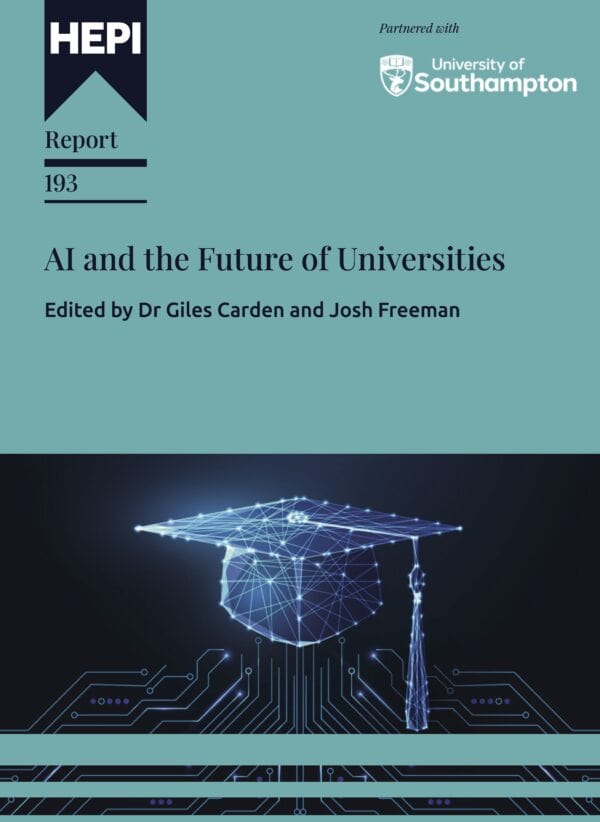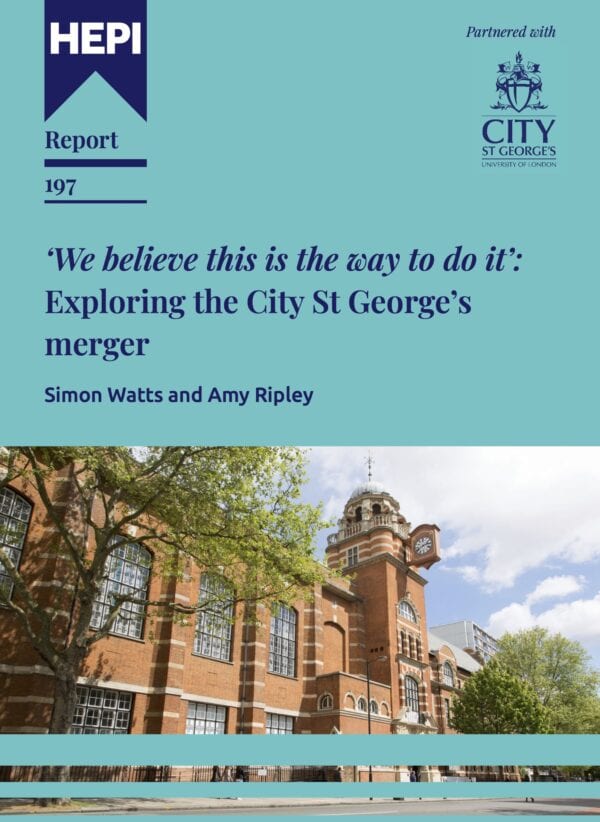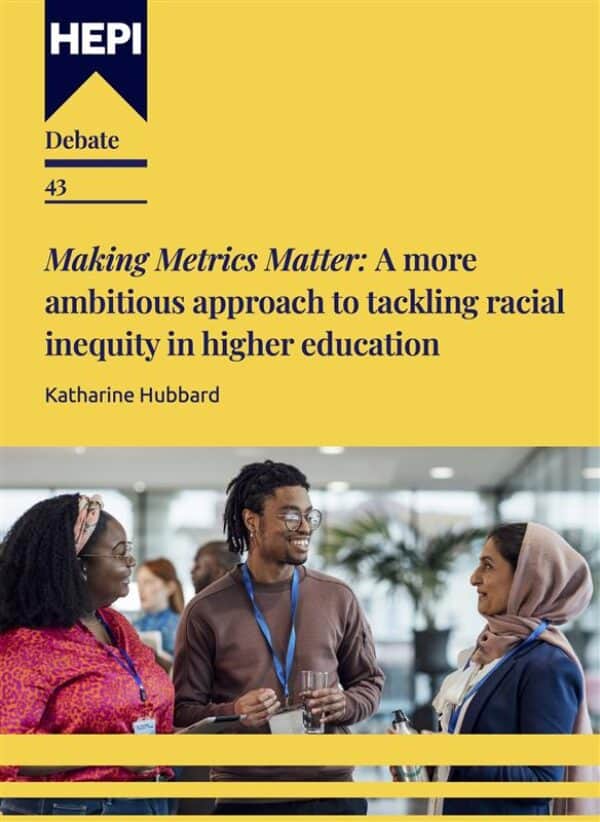AI and the Future of Universities
A new collection of essays, AI and the Future of Universities (HEPI Report 193) edited by Dr Giles Carden and Josh Freeman, brings together leading voices from universities, industry and policy. The collection comes at a point when Artificial Intelligence (AI) is projected to have a profound and transformative impact on virtually every sector of society and the economy, driving changes that are both beneficial and challenging. The various pieces look at how AI is reshaping higher education – from strategy, teaching and assessment to research and professional services.
The nine human contributors include:
- Dr Vinton G Cerf, Vice-President and Chief Internet Evangelist at Google;
- Professor Dame Wendy Hall FRS, Director of the Web Science Institute at the University of Southampton; and
- Professor Rose Luckin, Professor of Learner Centred Design at the UCL Knowledge Lab.
The collection, which has been kindly supported by the University of Southampton, includes a chapter on ‘Artificial intelligence and the future of research’ written by OpenAI’s ChatGPT using a carefully created prompt. Readers are asked to compare this piece to the human-written essays and to form their own opinions on its strengths and weaknesses.
The Foreword by Wendy Hall and Giles Carden states:
The chapters are not just a collection of essays on AI but a call to action. They frame the AI revolution not as a threat to be mitigated but as an opportunity to rethink the purpose and practice of higher education fundamentally. By drawing out the key themes, contrasting perspectives and areas of convergence and divergence, the collection aims to stimulate critical dialogue, encourage innovative practice and, ultimately, empower institutions to navigate this transformative era with foresight and purpose, ensuring AI elevates, rather than diminishes, the pursuit of knowledge and intelligence.
Key findings
- AI Literacy: Universities should embed AI literacy for staff and students, focusing on knowledge, ethics, transparency and continuous learning.
- Technology: Choice of technology is crucial and universities need a strategy and roadmap to ensure a joined-up approach to AI implementation. The economics of AI capabilities will need to be carefully evaluated to ensure value for money.
- Assessment: Generative AI challenges traditional exams and essays, requiring a shift toward evaluating creativity and critical thinking.
- The workforce: Institutions need to assess AI skills, embed them in professional development and nurture AI’s pedagogical leaders.
- Strategic advantage: AI can revolutionise strategy and operations though real-time insights, predictive modelling and efficiency gains.
- Human intelligence: Rather than replacing human cognition, AI could enhance it.
- Research: AI accelerates literature reviews, data analysis and interdisciplinary work alongside raising questions about ethics, bias and authorship.
Dr Giles Carden, Chief Strategy Officer at the University of Southampton, who has edited the collection, co-written the Foreword and contributed a chapter, said.
AI is not a distant prospect – it’s already a ubiquitous part of our lives. So these essays arrive at a pivotal moment. The report is a call to action for universities to embrace change, transform professional services, rethink educational models and prepare graduates for an AI-driven world of work, ensuring AI serves to improve, not diminish, the human pursuit of knowledge.
Nick Hillman OBE, Director of the Higher Education Policy Institute, said:
Every day, at least one person asks me what AI means for higher education. No one can answer that question with complete certainty just yet. But this collection of pieces by leading thinkers lights the way ahead.
It shows where AI is already making a difference and outlines AI’s future potential while, crucially, not diminishing the challenges it poses.
Notes for Editors
HEPI was founded in 2002 to influence the higher education debate with evidence. HEPI is UK-wide, independent and non-partisan. HEPI is funded by organisations and higher education institutions that wish to support vibrant policy discussions, as well as through events. HEPI is a company limited by guarantee and a registered charity.








Comments
Jonathan Alltimes says:
AI technologies can not interpret, understand or generate meaning and students need to be defended against the twaddle. We are witnessing an investment bubble driven by graphics chips and magical secret recipes and ingredients. AI technologies do have innumerable applications through the use of sensors and cheap data collection and processing, but their safe and reliable application will require decades of development. We can see a similar path of development to that of the dotcom boom supported by the Internet, World Wide Web and optical fibre and the social media boom supported by mobile telephony, whose regulation for information is still not agreed upon. As with these technologies and early computer technologies, higher education will be slow to change, principally because the scale of investment will be too small and the timing of investment will be too late. Given the scale of higher education, it has entered the era of batch or mass production. The use of spoken disputation and examination disappeared as the numbers of students rose to be replaced by written assessments. AI can assist in learning and assignments, but it is likely to cause a lot of damage to assessment since no means exists of rapidly verifying authenticity for large numbers of assignments.
Reply
Will Berard says:
Bizarre that a publication from an organisation founded to inform higher education debate “with evidence” is devoid of any as regards the presumed future ubiquity of AI in the workplace, or the pedagogical value of embedding AI into HE education. 🤔
Reply
Jonathan Tsetimi says:
The main issues of AI in higher education must be centred on policy. AI policies by various institutions should make not only for adoption but also responsible use. It is obvious that AI is increasing finding its place in higher education as in other facets of our daily life. It is imperative for institutional AI policies to take care of immediate and future fear especially in as they bother on algorithmic bias, equity and inclusivity.
Reply
Stephen Micheal Ocaya says:
I am an aspiring candidate for PhD from Africa- Uganda. I am passionate about crafting a research on AI in regard to how African leaders can respond. So far, very few leaders are championing this debate in African contexts where culture is very pivotal and a very high population of young people shall be overwhelming high by 2050. So, what does this mean for the future of AI technology in Africa? How can leaders embrace or envision AI technology that is best suitable for Africans. Whose values sha be embedded in the algorithms when it comes to Africa. Because record keeping and data is a great challenge in Africa. Notwithstanding the integrity of the data itself. I believe responsible and inclusive AI should be rooted in context, culture, and capacity. Where do we place Africa in all this? Help me to structure a better suited PhD topic. Thanks.
Reply
Stephen Micheal Ocaya says:
One of the challenges in African Universities, there are no policy currently being crafted in some of this instructions. Instead, some rigid course facilitators are threatening students to avoid Generative AI. This is running away from the reality and possible fear on their part. It is a known fact that quite a reasonable number of students are already using generative AI. The question is, how can we empower thefacilitators of learners so thst they can guide learners to use AI effectively. I believe what is very key for Universities is to create an environment that allows a free interaction with this technology especially in Africa where a few companies have invested in this technology at a larg scale. Issues around governance and policy from the government still needs to be embraced and addressed.
Reply
Dr. KAY says:
Interesting insights about the future of AI in higher education. The views shared by all the respondents highlights the need to consider the ethical and responsive integration of AI discourses into academic pedagogy.
Reply
Ravi Sharma says:
We believe that the impact of GenAI in Higher Ed is already being felt as disruptive and transformational. More so than LMS, MOOCs and the tilt to employability. That being said, this report is part of the discourse than a proffered solution of good practices.
Reply
Dr Craig Reeves says:
Dear Josh, I found your reply to my Guardian letter thoughtful and would like to invite you to discuss the issue of AI in higher education with me at an event at Birkbeck in the new year. I think it would be a really worthwhile conversation. Do get in touch if this is something you’d be up for. Best, Craig.
Reply
Add comment